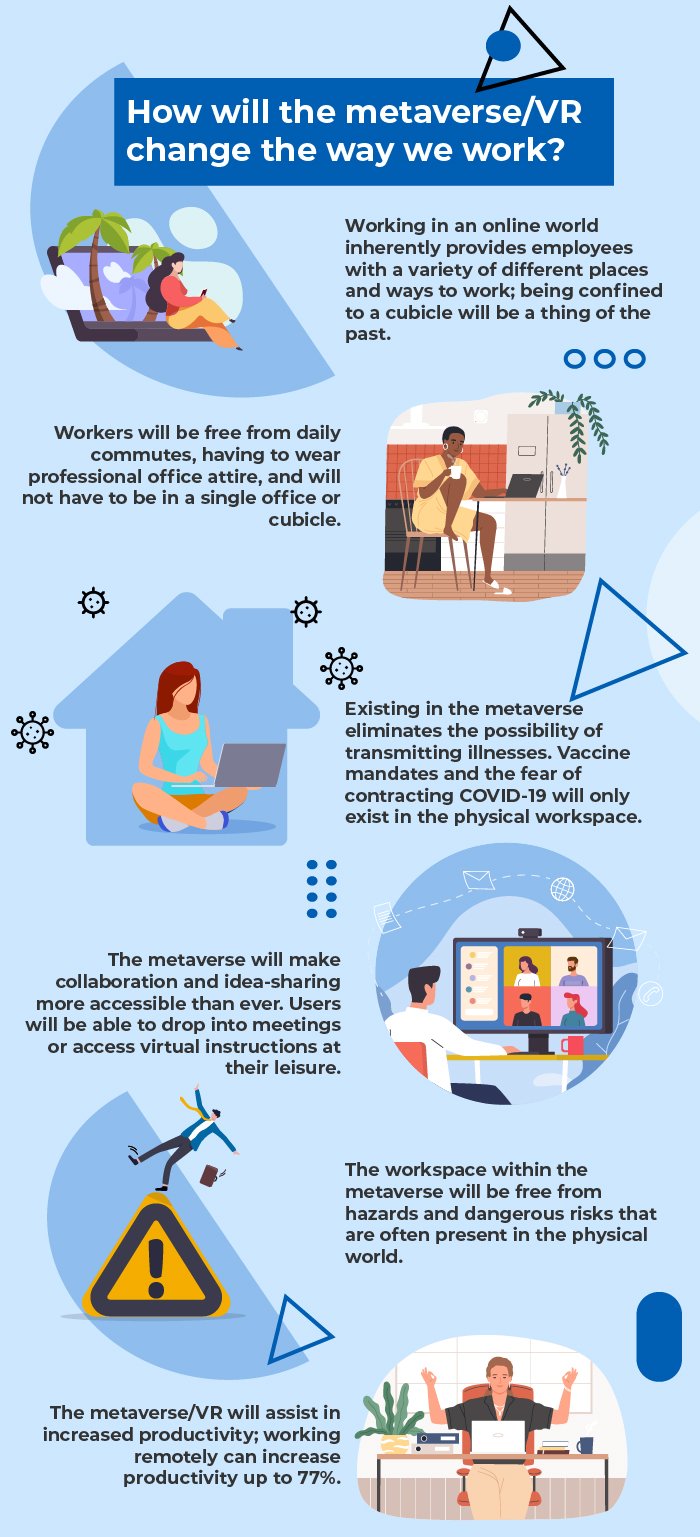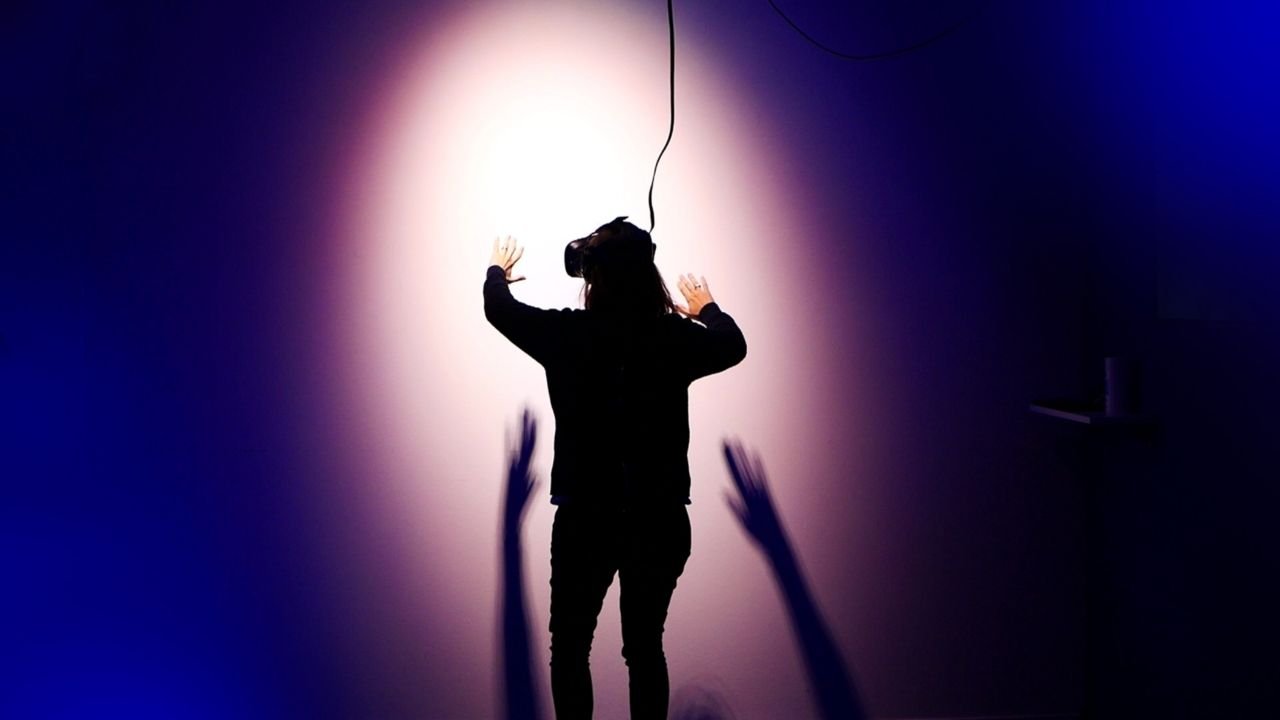- Understanding the metaverse
- Tech companies race to build the metaverse
- Facebook claims the metaverse will allow for an “infinite office” and reshape the digital economy
Summary: Remote work and online communication are becoming increasingly normalized. The future of work may involve something far beyond the likes of Zoom. Big investments in technology hint at a metaverse that will open up the possibility of new forms of work called the “infinite office” and reshape the digital economy.
Emerging technologies have brought workers many convenient alternatives to traditional work. Zoom has transformed the remote and hybrid work environment, but the development of the metaverse could be the ultimate game changer.
The ability to put on a pair of glasses and enter a new, virtual world isn’t just an exciting concept for entertainment and gaming purposes; the concept of the metaverse has a deep connection with virtual reality and gamification.
Virtual worlds like Fortnite, Roblox, and Minecraft have billions of users and economies that rival small countries. What role will these worlds and the metaverse play in the future of work?
Understanding the metaverse
The metaverse is often described as the next version of the internet — a shared, virtual space that is persistently online and active.
So, how is that any different than an online chatroom?
The term metaverse comes from Snow Crash, a 1992 science fiction novel in which human avatars and software demons inhabit a parallel 3D universe.

Now, the term has reemerged.
Facebook CEO Mark Zuckerberg has argued that the metaverse will open up the possibility of new forms of work in what he calls the “infinite office” and reshape the digital economy.
In September of last year, Facebook Connect introduced a new virtual office experience for those who work from home: Infinite Office, which promised to make WFH much more immersive.
In 2020, Facebook released its VR headset brand Horizon, an Oculus for Business platform. Currently in beta, Facebook Horizon will allow its users to build and share collaborative online worlds in which they are able to socialize, play games, or work together on projects.
Last month, Facebook announced Horizon Workrooms, a virtual meeting space where coworkers can join a meeting in virtual reality (VR) as an avatar or dial into the virtual room from a computer by video call.
“We shouldn’t really have to physically be together to feel present, collaborate or brainstorm,” Zuckerberg said.
Horizon Workrooms will allow users to create an avatar, collaborate with others on a whiteboard, stream what’s on their laptop, take notes, and interact with coworkers who video conference into the virtual room — all while sitting at their physical, real workspace.
Workrooms is part of Facebook’s broader ambitions to build the metaverse. Zuckerberg has said he wants Facebook to be primarily thought of as a metaverse company, or as he describes it, an “embodied internet.”
“You can kind of think about this as an embodied internet that you’re inside of rather than just looking at. We believe that this is going to be the successor to the mobile internet,” Zuckerberg said.
Tech companies race to build the metaverse
Microsoft CEO Satya Nadella recently said that his company is working on building the “enterprise metaverse.”
“As the digital and physical worlds converge, we are leading in a new layer of the infrastructure stack; the enterprise metaverse,” Nadella said during Microsoft’s fourth-quarter earnings conference call.
In April, Epic Games announced a $1 billion funding round to support its metaverse ambitions.
The eagerness with which tech companies are rushing to populate this digital frontier will completely alter the future of work and the workplace.
Instead of Zoom calls, the metaverse allows you to interact with coworkers in a virtual environment that feels nearly real. You can purchase houses, play video games, interact with friends, attend concerts, shop and buy items.
Eric Yuan, CEO of the videoconferencing app Zoom, said he believes AR and VR will play a big role in the future of work, especially remote work.
So far, the most accessible entry point into the metaverse has been predominantly through multiplayer video games. Many Fortnite players got their first look at the proto-metaverse during last year’s virtual Travis Scott concert, which was attended by more than 12 million people and remains the best example of the metaverse’s capabilities.
“In the future, working together will be one of the main ways people use the metaverse,” Zuckerberg wrote in a Facebook post.
“We’re not there yet,” Yuan said during a virtual conference about the future of work, “the headset is too heavy, there’s no eye contact.”
According to Scott Likens, a tech leader at PwC, the biggest obstacle to a widespread adoption of VR in the workplace is the idea that the technology is just for gaming and fear that it’s hard to implement.
How will the metaverse/VR change the way we work?

People learn the best by actually doing. In fact, soldiers, surgeons, and astronauts have trained for decades using VR. This technology has expanded into more general use where employees working in industries such as retail, logistics, and customer service are practicing with VR headsets.
In less than 10-years, VR will be used in 23 million jobs worldwide – thus, humanity’s entrance into the metaverse.
Metaverse-style ideas might help people organize the way we work – and more broadly – society, in a more productive manner. Shared standards and protocols that bring disparate virtual worlds and augmented realities into a single, open metaverse could help people work together and cut down on duplication of effort.
What should workers expect from the metaverse?
- Unparalleled convenience to workers. There will be no need to commute as all interactions will have digital alternatives that are equal in effectiveness.
- New job opportunities. Jobs that previously required in-person interaction will suddenly have virtual options, meaning that freelancing and remote work will expand.
- Monitoring from management might become a worry. Depending on what regulations are in place, higher-ups may have access to just about everything a worker does. Intrusion into worker privacy will need to be regulated, and workers may want to be aware of this as the regulations are in the early stages.
How will businesses profit?
Last fall, the Global HR Summit showcased how immersive technologies can enable digital transformation. The three-day event featured 50 speakers wearing Oculus Quest headsets while virtual attendees had the option to use their own headsets for an immersive experience or simply use their laptop. Headsets were shipped out to all 50 speakers, and it was noted that the costs were significantly less than flying speakers out, providing accommodations, and other conference-related expenses.
Companies will need to transition their marketing strategies to accommodate a shared, virtual economy. Companies will need to do market research on their new customers in the metaverse.
While there will be ads in the metaverse, brands can actually be part of creating the metaverse itself, according to Cathy Hackl, tech futurist and speaker with expertise in AR/ VR and the metaverse.
Companies that are already utilizing the metaverse
Videogame maker Roblox Corporation is already using the metaverse concept for its videogames.
Nvidia Corporation, a graphics processing unit company, developed the Omniverse, which is basically a metaverse for engineers.
Facebook purchased Oculus VR and developed the Horizon/virtual world meeting space with the metaverse in mind.
Fastly, a cloud computing service, is also utilizing the metaverse.
Who owns the metaverse?
There is no single fully-fledged metaverse that has been created yet, but multiple tech giants are investing in and working on their own metaverses.
“This metaverse is going to be far more pervasive and powerful than anything else. If one central company gains control of this, they will become more powerful than any government and be a god on Earth,” said Tim Sweeney, CEO of Epic Games.
Many believe the metaverse is inevitable, but is it plausible?
A universal metaverse would take decades of infrastructure development and billions of dollars to become reality.
- New ways of creating, exchanging and paying for digital goods and services will have to be developed.
- The headgear hardware will have to improve; VR glasses are too large and impractical and would need to be condensed into much smaller glasses.
- Threats to privacy, ownership rights and environmental damage caused by the massive computing power needed to sustain alternative digital worlds would need to be addressed.
In 2020, Microsoft and the Harvard Business Review Analytic Services released Mixed Reality: A New Dimension of Work, which dissected the role and importance of mixed reality in the workplace across a range of industries, including: manufacturing, engineering, construction, retail, defense, and education.
The survey noted that 68% of businesses believe mixed reality is important to fulfilling company strategic goals, and nearly 90% are currently exploring, piloting, or deploying mixed reality. VR becoming mainstream in the workplace may not be far off.
When will the metaverse become mainstream?
With the use of VR, the workforce will be transformed. Workers will no longer have to choose between remote work or going to the office because the office will be available anywhere.
But despite Facebook and other Big Tech innovations, the industry faces a number of challenges that need to be addressed and fixed before the metaverse becomes mainstream.
Headsets for an entire workforce will be a major expense; the Oculus Quest 2 alone costs $299, and the headsets are still heavy, bulky, and impractical.
The technology isn’t as practical as a phone call or video conference, and some users could potentially experience headaches and nausea while using the device.
Questions remain on how tech companies will handle safety and privacy issues in the metaverse, as well as whether people will really want to live much of their lives or work inside an immersive virtual simulation.
VR/the metaverse can enhance working remotely by helping workers to feel part of a team. People can interact with co-workers, attend interviews, find new jobs, communicate with clients and build businesses. The metaverse doesn’t need to be all-consuming; it can simply offer new, exciting opportunities for people.

















